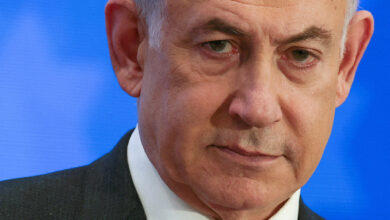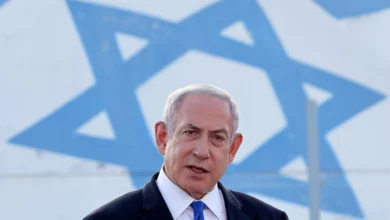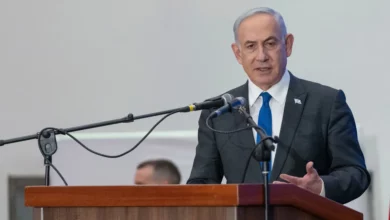Following his visit to Washington two weeks ago, Israeli Prime Minister Benjamin Netanyahu was scheduled to visit Egypt yesterday to meet with President Mubarak. The purpose of his visit was to persuade the Egyptian leadership to put pressure on the Palestinians to enter into direct negotiations with the Israelis.
Both the Egyptian and Israeli sides said their talks were not related to the Palestinian President’s same-day visit to Egypt.
It is thought that Netanyahu wishes to present himself in the eyes of international public opinion as a man of peace who is ready to pay the price for a peaceful settlement with the Palestinians by making shuttle visits to Cairo and Washington before the ten-month settlement moratorium expires on 26 September.
Calls by Arab states to submit the Palestinian issue to the UN Security Council if indirect negotiations fail have added to the importance of the meeting between Mubarak and Netanyahu.
Commenting on these recent developments, Samir Ghattas, director of the Maqdis Center for political studies, said, “The Palestinians and Arabs say they will not enter into direct negotiations if the building of settlements continues…but this then provides a pretext for Netanyahu to say he was ready for peace.”
The Arab position, according to Ghattas, will only lead to the resumption of settlement building after the moratorium–and therefore the indirect negotiations–both come to an end.
Reaching this point could represent the greatest threat to the Palestinian issue, said Ghattas, since the building of more settlements will complicate the situation further. According to Ghattas there are currently half a million Israelis and 2.6 million Palestinians in the West Bank. With more settlements being established, the proportion of Israelis in the West Bank will rise to 30 percent and Israelis will start talking about new borders for the Israeli state, making it difficult to push them out of the West Bank, including East Jerusalem, said the analyst.
Ghattas believes Egypt will not take a unilateral decision to move on to direct negotiations as it fears coming under fire later. It will instead refer the matter to the Arab League, especially as there are three upcoming Arab summits scheduled for the near future.
If the issue is referred to the UN and the US does not veto the unilateral decision declaring the establishment of a Palestinian State, Israel will still emerge as the winner, said Ghattas, because it will no longer be subject to Article 4 of the Geneva Convention which classifies it as an occupying state.
Ghattas confirmed that during his fifth visit to Washington Netanayahu succeeded in extracting promises from Obama that Israel will not have to reveal details about its nuclear program.
Worse still, in Ghattas’ view, are pledges made by Obama to provide Israel with advanced technology for the peaceful use of nuclear power. “Since Israel has its Dimona nuclear reactor, it will be easy for it to use it for military purposes”–particularly as long as the US protects Israel’s policy of nuclear ambiguity, said Ghattas.
Translated from the Arabic Edition.




